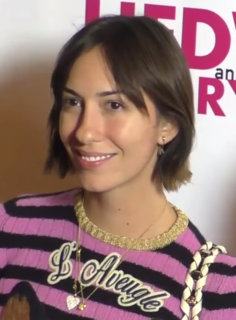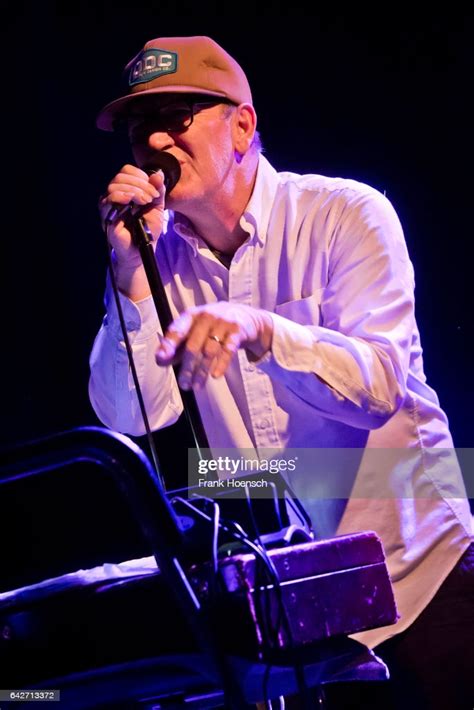A Quote by Curtis Hanson
I never intended to have a career as a journalist, writing about people who make movies. I did it as something that was really rewarding to do, given the opportunity to express myself about something I cared about, and also to learn a lot by watching filmmakers I admired. In a sense, it was my film school. After doing it for a few years, I decided that the time had come to get it together and do some work of my own. Even for a cheap movie, you need film stock and equipment and actors. Whereas to write, all you need is paper and an idea, so I felt that writing might be my stepping stone.
Quote Topics
About
Actors
Admired
After
Also
Cared
Career
Cheap
Come
Decided
Did
Doing
Equipment
Even
Express
Felt
Few
Film
Film School
Get
Get It Together
Given
Had
Idea
Intended
Journalist
Learn
Lot
Make
Might
Movie
Movies
My Own
Myself
Need
Never
Opportunity
Own
Paper
People
Really
Rewarding
School
Sense
Some
Something
Stepping
Stepping Stone
Stock
Stone
Time
Together
Watching
Whereas
Work
Write
Writing
Years
Related Quotes
I did it [photojournalism] as something that was really rewarding to do, given the opportunity to express myself about something I cared about, and also to learn a lot by watching filmmakers I admired. In a sense, it was my film school. After doing it for a few years, I decided that the time had come to get it together and do some work of my own. So I stopped doing that and wrote some screenplays on speculation, because even though I wanted to direct, to direct you need a lot of money.
When I start on a film I always have a number of ideas about my project. Then one of them begins to germinate, to sprout, and it is this, which I take and work with. My films come from my need to say a particular thing at a particular time. The beginning of any film for me is this need to express something. It is to make it nurture and grow that I write my script- it is directing it that makes my tree blossom and bear fruit.
When I make a film, I never stop uncovering mysteries, making discoveries. When I'm writing, filming, editing, even doing promotional work, I discover new things about the film, about myself, and about others. That is what I'm subconsciously looking for when shooting a film: to glimpse the enigmas of life, even if I don't resolve them, but at least to uncover them. Cinema is curiosity in the most intense meaning of the word.
Filmmaking, at the end of the day, is really - in addition to the story and all of the equipment and the actors, it's really about time management. And so the smartest filmmakers are the ones who sort of pre-visualize the film in their head and are literally shooting the shots they need to cut the story together.
With abstract work, I never was quite sure what it was that felt right about the painting, but I did know that I responded to it and I liked whatever it was offering me. That's something that seems to happen as well when I'm writing, where maybe things that don't necessarily make a lot of logical sense are put together, and yet we struggle to make sense of these things somehow. I'm not quite sure why that is; it's something about human nature, I guess.
I wrote lots of scripts that never got made and they were terrible. I thought they were good at the time. You can't write two scripts and expect your career to take off. Keep writing. Be you. Be original. A lot of people go for a genre, which is fine if you can do that really well, but we all have such layered histories. We all come from a unique background. Write about your past, write about you. Or make stuff up, but make it about something that really matters.
I wanted to be a director first to protect my writing. I'm a playwright and you don't need to protect your writing when you're in the theater because everyone's there to protect the writing. When I had an idea for a film that I really cared about as my own, I wanted to direct it, and then I immediately became interested in directing in and of itself because it's such a deep art. You suddenly have all these tools at your disposal to tell the story.
People buy pads all the time, because they want to write stuff down. We're never going to get away from paper, ever. People like writing; that's why more people are writing more real thank-you notes now - not just to stand out, but because there's something about pen to paper, about holding something cool in your hands.
I've always known that I've wanted to write, but I always saw myself doing that in the context of something other than film, so it was a really beautiful and kind of perfect moment in my life when I realized that I could combine this idea of wanting to write and tell my own stories with the environment I had grown up in and knew well - that I could make film as opposed to writing being a departure from what I knew.


































